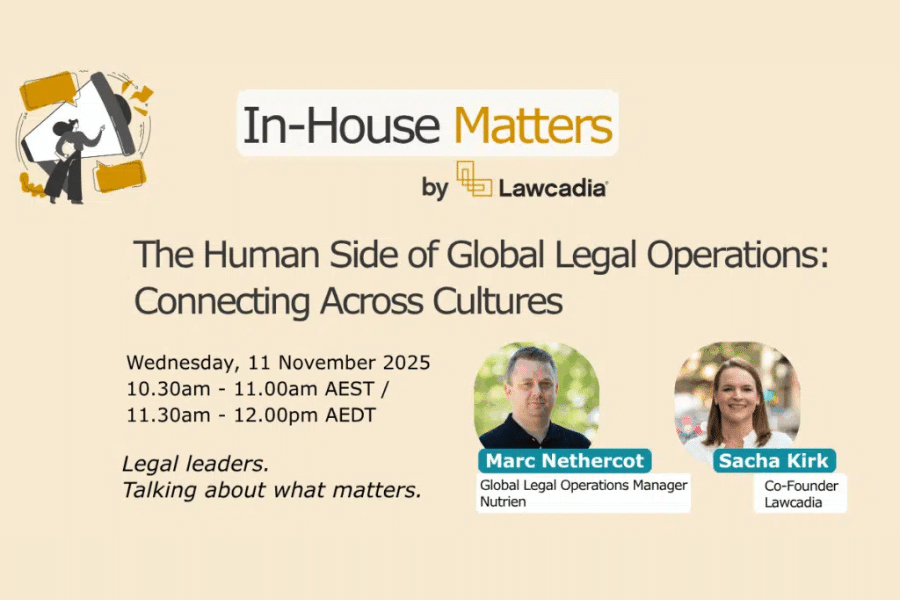In the latest episode of In-House Matters by Lawcadia, Co-Founder and Chief Marketing Officer Sacha Kirk spoke with Marc Nethercot, Global Legal Operations Manager at Nutrien, about the human side of working across borders and what it takes to build trust, adapt communication, and collaborate effectively in a global environment.
From navigating time zones to understanding cultural differences, Marc shared practical strategies and personal reflections shaped by his experience leading projects and relationships across continents.
Acknowledge differences
“First, the challenge is acknowledging the challenge,” Marc said. “We don’t know what we don’t know.”
He explained that effective collaboration begins by recognising and openly discussing cultural and communication differences. “You’ve got to acknowledge this and start a transparent conversation. It’s never an unwelcome conversation and it’s always super valuable.”
Communicate with clarity
Time zone differences can make coordination difficult, but they also highlight the need for intentional communication.
“We have four hours of working time that overlap,” Marc said. “So when you do get on a call, it’s short and you are going to get it done. [But] that’s not a particularly fun way to work with people.”
He emphasised that building relationships should never be sacrificed for efficiency. “Without the relationship, the work won’t get done, or it won’t get done very well. So you actually do have to prioritise it.”
Rather than jumping straight into business, Marc suggests starting with curiosity. “Ask some curiosity questions, whether that’s ‘what do you think about this?’ or ‘how’s your week going?’ Just to make it feel like there’s a constant back and forth — not just a transactional relationship.”
Adapt your approach
Marc described how assumptions about communication style can easily lead to misunderstanding. “We can’t assume that every person works and communicates in the same way,” he said.
He recalled an early lesson in cultural context:
“I was working with a team in India on a project. I’d say, ‘I think this will work better in Australia if we do it like this — what do you think?’ and I’d be greeted with silence.”
Marc explained how he took the silence to mean that everyone agreed, and he assumed it would progress accordingly. But nothing happened.
After learning about high-context and low-context cultures, Marc recognised what was really happening.
“In India, a high-context and high-hierarchy culture, they saw me as someone higher up the food chain and no one there felt it was appropriate to go, ‘No, Marc, that’s not going to work.’ Which is exactly what I needed to hear.”
This experience reinforced the value of adjusting communication to suit different cultural norms and hierarchies.
Learn from others
Finding trusted local insight can make a significant difference. “If you can find somebody where you’ve got that right chemistry — someone within that culture who can help you understand how things work — then you can start to bounce things between you and [they can] act as an interpreter,” Marc said.
He and Sacha also discussed common cultural missteps, such as the significance of hierarchy with simple things such as allocating accommodation or the meaning behind gifts. “These things can seem small,” Marc said, “but they’re deeply important.”
According to Marc, a little cultural awareness can prevent unnecessary conflict.
Prioritise relationships
For Marc, people always come first. “You need to prioritise the people you work with as humans, not just as tools in your toolbox,” he said. “If people know you as a human and feel that you know them as a human, they’re far more likely to give you the time of day with the things that you need.”
He shared how he manages his own priorities to reinforce that commitment. “My manager is also overseas. I’m more likely to move my call with my manager than with my reports, because I need my reports to be on side and working for me.”
Lead with authenticity
Authenticity and transparency, Marc believes, are the foundation of effective leadership. “If you are not reliable or honest — if you’re not taking the time to make sure people understand what’s happening — you shouldn’t expect to get great results.”
His own experience as an immigrant has shaped how he leads and connects with others. “I think if you are a permanent immigrant somewhere, it really knocks you out of the groove of wherever you were born,” he said. “You start to see yourself as a global citizen and far more open to the different ways other people do stuff.”
Marc also highlighted the value of learning from diverse perspectives. “I’ve worked with colleagues in other countries and initially thought, why do they do it like this? But there’s always some positive takeaway — some benefit that you wouldn’t have got doing it your own way.”
Lessons for in-house leaders
Marc’s reflections remind us that global legal operations are, above all, human. Success relies on empathy, adaptability, and curiosity. Key lessons include:
- Acknowledge and respect cultural differences to prevent misunderstanding and build stronger collaboration
- Prioritise relationships and personal connection even when time zones and distance make it difficult
- Be authentic and transparent — reliability and honesty build trust across every culture
- Adapt communication styles to suit different contexts and hierarchies
- Seek local insight from cultural mentors or colleagues to navigate nuances
- Embrace continuous learning — every culture and collaboration offers a valuable perspective
As Marc concluded, “Be aware that these differences exist and that you cannot steamroll your own cultural way of working over other people. It will not work. You have to open that conversation and understand the correct way for us to communicate so that we all feel valued and listened to.”
This article was originally published on our sister site lawcadia.com.

